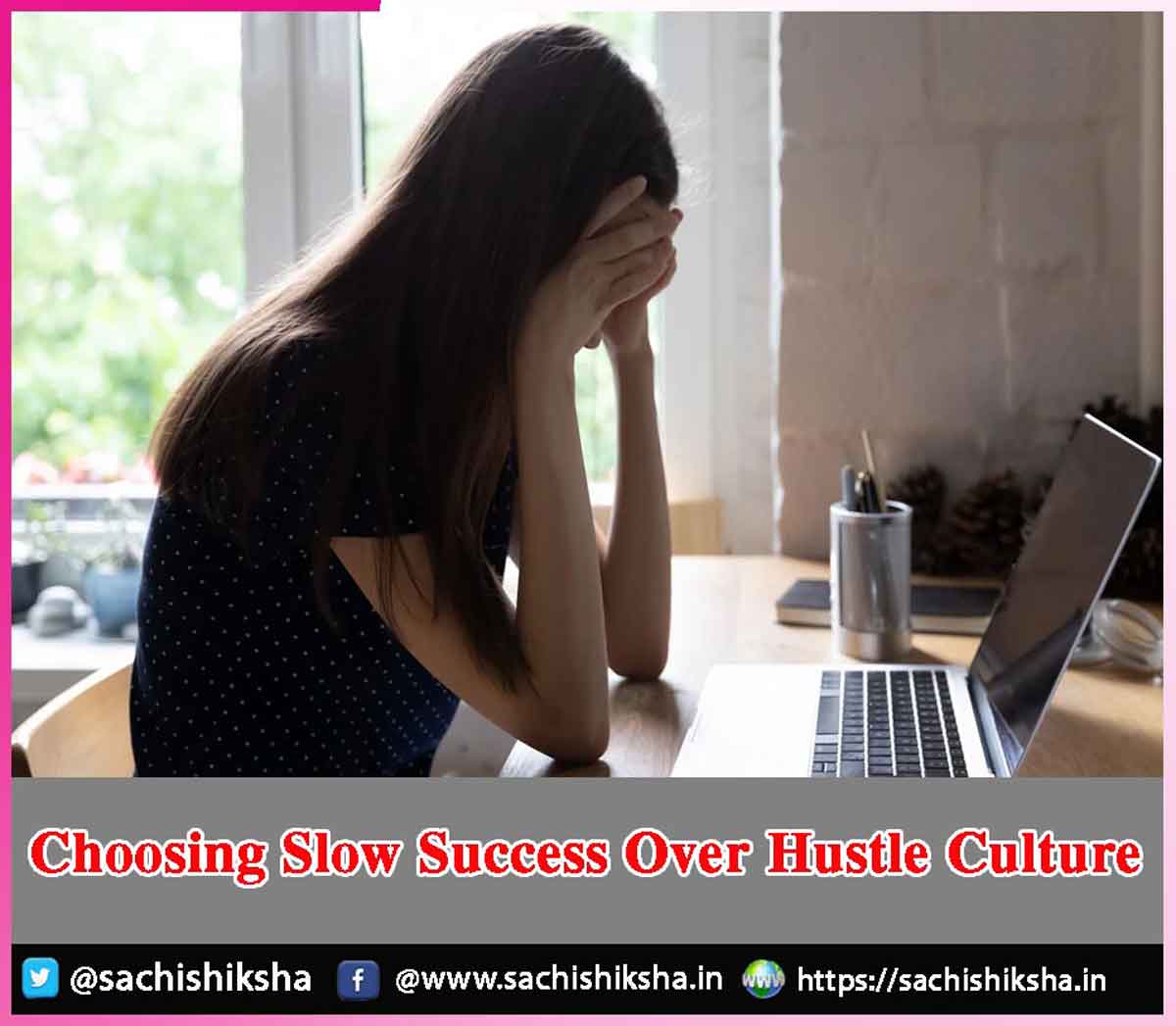Choosing Slow Success Over Hustle Culture
Introduction In recent years, the term “hustle culture” has dominated conversations around work ethic, success, and productivity. Glamorized by influencers and entrepreneurs alike, hustle culture emphasizes relentless work, long hours, and the belief that constant grinding leads to success. However, this lifestyle often comes at a steep cost: mental exhaustion, burnout, strained relationships, and a perpetual feeling of inadequacy. Choosing slow success means prioritizing sustainability, mental well-being, and personal growth over rapid achievement.
Table of Contents
The Rise and Reality of Hustle Culture

- Your worth is defined by your productivity.
- Rest is a sign of laziness or weakness.
- You must always be doing more—working more, earning more, and achieving more.
It’s a culture that links hustle with honor and burnout with ambition.
The Origins of Hustle Culture
Hustle culture didn’t appear out of nowhere—it evolved through social, economic, and technological changes.
The Startup Boom
Hustle approach was further encouraged by the emergence of Silicon Valley and entrepreneurial environment. Entrepreneurs such as Elon Musk and Gary Vaynerchuk become symbols of aspiration. Their grueling schedules and do-or-die attitudes set a new standard: if you’re not working 80 hours a week, you’re not serious enough.
Social Media and Influencer Economy
Social media played a major role in popularizing hustle culture. Platforms like Instagram, LinkedIn, and TikTok flooded users with content showcasing luxurious lifestyles, “rise and grind” routines, and the curate image of non-stop success. As influencers monetized their personal brands, the line between life and work blurred even further.
The Appeal of Hustle Culture
Despite its demands, hustle culture continues to captivate millions. Why?
-
Validation and Identity
In a world where output reigns supreme, being occupied represents an act of pride. People take pride in overworking because it garners respect, admiration, and a sense of importance.
-
Fear of Falling Behind
There’s a constant pressure to keep up—with peers, with technology, with the ever-evolving job market. Hustling feels like a survival tactic.
-
Illusion of Control and Progress
Hustle culture gives people a sense of agency: if you work harder, you’ll get further. This belief can be empowering, especially in uncertain economies. It encourages people to believe their destiny lies in their own hands.
-
Success Stories
We’re surrounded by narratives of self-made individuals who “made it” by working tirelessly. These success stories often skip over privilege, luck, or systemic support, reinforcing the myth that hustles alone guarantees achievement.
The Dark Reality of Hustle Culture
While the promises of hustle culture are enticing, its impact on individuals and society is far from glamorous.
Burnout Epidemic
Stress is one of hustle cultural most obvious effects. Defined by chronic stress, exhaustion, and reduced performance, burnout is now recognized by the World Health Organization as an occupational phenomenon. People push themselves beyond healthy limits in the name of hustle, leading to serious mental and physical health problems.
Mental Health Issues
Anxiety, depression, and feelings of inadequacy are on the rise among workers and entrepreneurs. When rest is shamed and overwork is praised, people internalize failure when they can’t keep up.
Erosion of Work-Life Balance
People check emails at midnight; skip meals for meetings, and measure self-worth by achievements. Over time, personal relationships suffer, and joy becomes tied exclusively to productivity.
Unrealistic Expectations
Social media fuels unrealistic comparisons. We see the highlight reels—young CEOs, constant promotions, and overnight success stories—but rarely the struggles or years of preparation behind them. This distorted reality can demoralize even the most diligent workers.
Exploitation in the Workplace
Many companies take advantage of hustle culture by encouraging overwork without proper compensation. “Passion” is used as an excuse for unpaid internships or long hours, exploiting those who want to prove themselves.
Who Pays the Price?
Although hustle culture affects people across professions, some groups bear a heavier burden.
- Gig Workers and Freelancers: Often juggling multiple jobs without job security.
- Young Professionals: Pressured to establish careers quickly, often sacrificing health and stability.
- Women and Minorities: Expected to work harder to gain recognition in unequal systems.
- Entrepreneurs and Creative’s: Struggling to grow their brand while managing constant content creation and performance.
A Culture Ready for Change
Despite its dominance, signs of resistance to hustle culture are growing.
-
The Rise of the Anti-Hustle Movement
Movements like “quiet quitting,” “the great resignation,” and “slow success” reflect a cultural shift. More people are questioning the wisdom of constant grinding and seeking purpose, balance, and well-being.
-
New Workplace Models
Flexible hours, remote work, four-day workweeks, and results-based performance models are gaining popularity. These shifts allow for more autonomy and emphasize outcome over hours spent.
Practical Alternatives to Hustle Culture
Here are some ways individuals can break away from the grind and embrace healthier approaches:
-
Set Clear Boundaries
Define work hours and stick to them. Avoid answering emails or taking calls during personal time.
-
Prioritize Deep Work over Busy Work
Instead of attempting to handle everything, prioritize significant impact projects. Productivity is not about being occupied; it is about staying efficient.
-
Rest Without Guilt
Take breaks, vacations, and mental health days. Relaxation is not a reward; it is required for sustained achievement.
-
Celebrate Small Wins
Acknowledge progress along the way. Not all success needs to be monumental.
-
Seek Fulfillment, Not Just Achievement
Engage in work that aligns with your values. Fulfillment often comes from impact, not income alone.
What Is Slow Success?
The Philosophy of Slow Success
Slow success is about achieving long-term goals through steady, mindful progress rather than short bursts of intense effort. It centers on:
- Quality over quantity;
- Balance over burnout;
- Meaning over metrics;
Inspired by the “slow living” movement, slow success invites individuals to pace themselves, enjoy the journey, and align their actions with their core values.
Key Principles
- Intentionality – Knowing why you’re doing what you’re doing.
- Sustainability – Building habits and systems that don’t require sacrifice of health or values.
- Reflection – Regularly evaluating progress and re-aligning goals.
- Patience – Trusting that long-term success is more fulfilling and resilient.
Why Choose Slow Success?
-
Better Mental and Emotional Health
Working at a sustainable pace reduces stress, prevents burnout, and allows time for hobbies, family, and rest. This balance supports emotional well-being and builds resilience during challenging times.
-
Stronger Relationships
Hustle culture frequently distances people from their backing systems. Slow success nurtures community by making space for connection, collaboration, and shared experiences.
-
Higher Quality Work
Slowing down enhances creativity, critical thinking, and focus. When people are not rushed, they make fewer mistakes and produce more thoughtful, and innovative results.
-
Long-Term Stability
Quick wins often lead to burnout or shortcuts that backfire. Slow success fosters skills, knowledge, and habits that support sustainable careers and personal growth.
-
Authentic Fulfillment
Chasing constant milestones can leave individuals feeling empty even after achieving “success.” Slow success encourages alignment with personal values, leading to deeper satisfaction.
How to Embrace Slow Success?
-
Redefine Success
Instead of measuring success by income, titles, or social media followers, consider:
Am I growing personally and professionally?
Do I feel fulfilled by my work?
-
Set Intentional Goals
Rather than aiming for immediate results, set goals that prioritize long-term impact. Ask yourself:
What legacy do I want to leave?
How do I want to feel during the journey?
Break these goals into small, consistent steps that allow for flexibility and self-compassion.
-
Create Healthy Routines
Instead of working late into the night, build routines that include:
- Regular breaks;
- Time for exercise, nature, and reflection;
- Meaningful conversations and social time;
Balance your ambition with rest and restoration.
-
Embrace Delayed Gratification
In hustling culture, immediate outcomes are the primary goal. In slow success, patience is a virtue. Trust the process and recognize that meaningful growth takes time. Embrace thankfulness for tiny victories and see failures as possibilities to grow instead of failures.
-
Learn to Say No
One of the hardest, yet most powerful tools for slow success is the ability to say no—to overwork, unrealistic deadlines, or values that don’t align with your own. Protect your time and energy by choosing opportunities that support your long-term well-being.
-
Build a Supportive Environment
Surround yourself with people who understand and support your choice to grow slowly and sustainably. This can include:
Mentors who prioritize well-being; Peers who value depth over speed; Online communities focused on intentional living.
Common Myths about Slow Success
Myth 1: It Means Laziness
Reality: Slow success requires discipline, consistency, and patience. It’s not about doing less—it’s about doing what matters most, without burnout.
Myth 2: You’ll Be Left Behind
Reality: Fast success is often short-lived. Those who build slowly tend to have more durable careers and stronger foundations.
Myth 3: It Lacks Ambition
Reality: Choosing slow success is one of the most ambitious and courageous choices. It means resisting pressure and defining your own path.
From Hustle to Harmony: A Cultural Shift
The shift from hustle culture to slow success is not just personal—it’s cultural. More companies, creators, and professionals are now advocating for:
- 4-day work weeks;
- Mental health days;
- Flexible schedules.
Conclusion
Choosing slow success is a powerful act of resistance in a world that equates speed with value. It requires faith in your process, clarity in your goals, and the courage to trust that real growth takes time.
In the end, slow success is not about doing less—it’s about doing better. It’s about rising without racing, achieving without anxiety, and succeeding without sacrificing what matters most. By stepping away from hustle culture, you reclaim your time, your peace, and your purpose. And that, perhaps, is the greatest success of all.












































